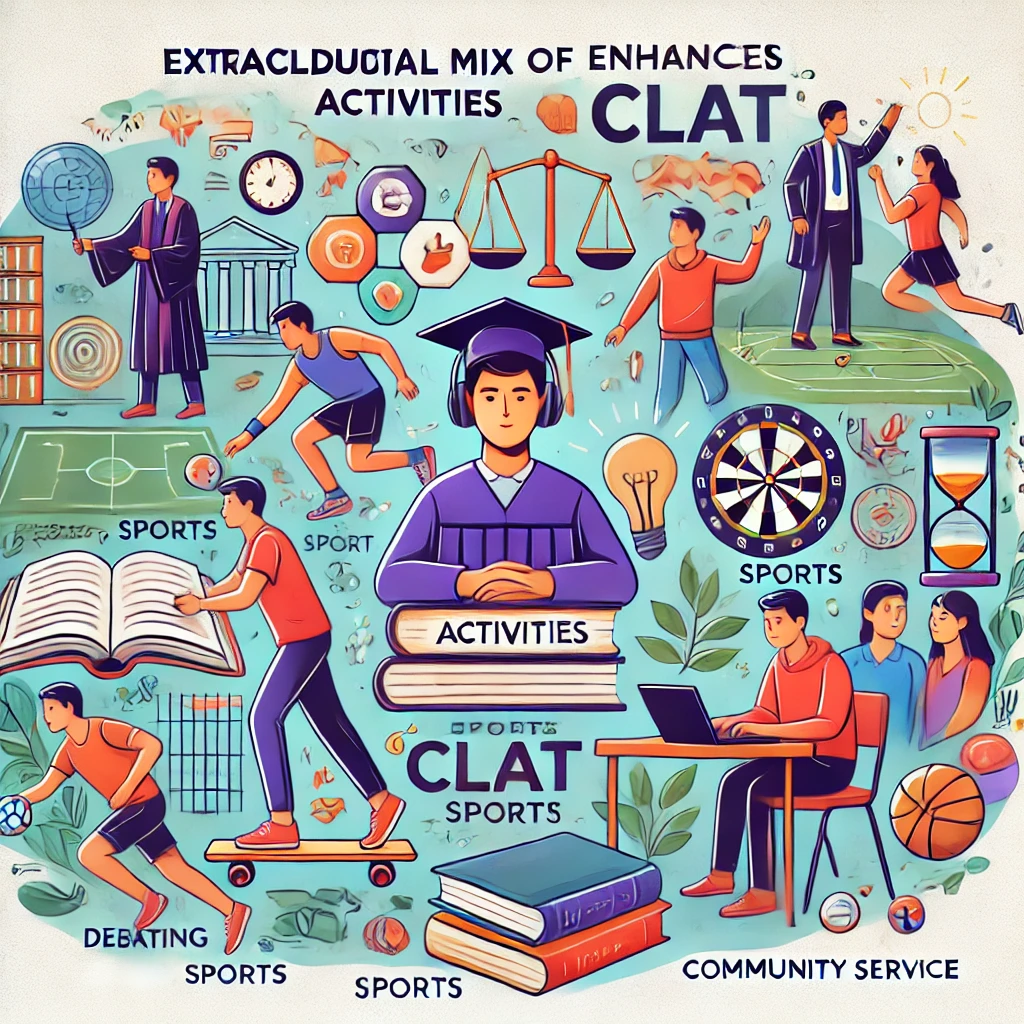When preparing for an intense and competitive exam like the Common Law Admission Test (CLAT), students often focus entirely on academics, devoting hours to studying, practicing mock tests, and revising key concepts. While rigorous study is undoubtedly essential, there is another equally valuable aspect of preparation that is often overlooked: extracurricular activities.
1. Developing Critical Thinking and Problem-Solving Skills
One of the most important skills required for CLAT, particularly in sections like Logical Reasoning and Legal Reasoning, is the ability to think critically and solve problems. Extracurricular activities, especially those that involve debates, public speaking, or quiz competitions, help students develop these crucial skills.
Example: Participating in a debate society forces you to think quickly, analyze arguments, and defend your position logically—skills that are directly transferable to answering CLAT’s legal and logical reasoning questions. Debates also expose you to diverse perspectives, enabling you to approach problems from multiple angles, which is crucial in law.
Similarly, participating in quiz competitions enhances your ability to recall information quickly and accurately, which is useful for sections like General Knowledge and Current Affairs. Regular practice in such environments will fine-tune your analytical skills, making it easier to approach complex questions during the exam.
2. Enhancing Reading and Comprehension Abilities
The CLAT exam places significant emphasis on comprehension-based questions, especially in the English and Legal Reasoning sections. Strong reading comprehension skills are essential to interpreting complex legal texts and lengthy passages under time pressure. Extracurricular activities like reading clubs, literary societies, or even engaging in writing activities can sharpen your reading abilities.
Example: Being part of a reading or literary club often requires you to read novels, essays, or articles across different genres. This broadens your vocabulary and improves your ability to understand different writing styles. Writing blogs or articles can further enhance your capacity to express ideas clearly and concisely, an essential skill for both the CLAT exam and legal studies in general.
By immersing yourself in extracurricular reading and writing, you’ll develop the stamina and skill needed to tackle the dense comprehension passages in CLAT more effectively.
3. Boosting Time Management Skills
Balancing extracurricular activities with academic commitments can teach you one of the most valuable lessons for CLAT preparation—time management. Since CLAT is a time-bound exam, managing time effectively during the exam is critical. Participating in activities outside of academics forces you to juggle multiple responsibilities, which translates to better time management skills during exam preparation.
Example: Students who engage in sports, student government, or cultural activities must often balance practice sessions or events with their academic workload. This experience helps develop discipline and teaches how to prioritize tasks. These skills are essential when preparing for CLAT, where you need to allocate time efficiently between different sections of the exam as well as between various subjects during your preparation.
Furthermore, when participating in time-bound extracurricular competitions like debates or quizzes, students develop the ability to think on their feet and make quick decisions, which is invaluable during the fast-paced CLAT exam.
4. Building Confidence and Communication Skills
Law is a profession that requires excellent communication skills, both oral and written. Extracurricular activities that involve public speaking, such as Model United Nations (MUN), mock trials, or drama clubs, can significantly improve your confidence in articulating ideas and arguments—skills that will serve you well, not only in CLAT’s English and Legal Reasoning sections but also in interviews and group discussions that are part of the admissions process at many law schools.
Example: In a Model United Nations simulation, students act as diplomats and must debate, negotiate, and present solutions to global problems. This requires not only an understanding of international issues but also the ability to communicate ideas clearly and persuasively. Similarly, participating in mock trials helps in understanding the legal system while improving your ability to present arguments coherently under pressure.
By engaging in these activities, you build the confidence to tackle challenging questions in the exam, and you also develop the articulation skills needed to perform well in personal interviews or legal discussions in the future.
5. Reducing Stress and Preventing Burnout
CLAT preparation can be mentally exhausting. The continuous pressure to perform well in mock tests, cover vast syllabi, and improve scores can lead to burnout if not managed carefully. Extracurricular activities provide a much-needed break from the academic grind and help alleviate stress, making your preparation more sustainable in the long run.
Example: Activities like sports, music, art, or even yoga and meditation are known for their stress-relieving benefits. Physical activities such as sports increase the release of endorphins, improving mood and reducing anxiety. Meanwhile, creative pursuits like music or art allow for emotional expression, which can act as an outlet during high-pressure periods.
Incorporating such activities into your daily routine ensures you maintain a healthy balance between preparation and relaxation. By keeping your stress levels in check, you’ll be able to study more effectively and maintain focus over the long term.
6. Cultivating Discipline and Perseverance
Extracurricular activities such as sports, dance, or martial arts require consistent practice, discipline, and dedication—all qualities that are vital for success in the CLAT exam. The discipline to follow a regular routine, the ability to push through setbacks, and the perseverance to improve incrementally are all attributes developed through extracurricular involvement.
Example: Sports, in particular, teach students the importance of practice, teamwork, and resilience. Athletes often face defeats and injuries, yet they learn to bounce back and continue improving. This mindset of perseverance and continuous improvement is exactly what you need to excel in CLAT. Just as in sports, CLAT preparation is not about immediate success but about consistent effort and gradual improvement.
By developing these qualities through extracurricular activities, you’ll build the mental resilience needed to handle the ups and downs of CLAT preparation, helping you stay motivated throughout the journey.
7. Broader Knowledge and Awareness
CLAT’s Current Affairs section requires a solid understanding of what’s happening around the world. Participating in extracurricular activities like quiz clubs, debate teams, or even social service groups can help expand your general knowledge and awareness of social, political, and economic issues. Engaging with real-world problems through these activities makes it easier to recall important events during the exam.
Example: If you’re involved in a social service group or a youth parliament, you are likely to be exposed to current socio-political issues, government policies, and international developments. This practical engagement with the world around you is directly relevant to the General Knowledge and Current Affairs section of the CLAT exam.
Additionally, participating in these activities keeps you updated on contemporary issues, making it easier to prepare for news-based comprehension passages that are now an integral part of the CLAT exam pattern.
8. Networking and Mentorship Opportunities
Extracurricular activities provide you with opportunities to meet like-minded individuals, teachers, and mentors who can offer valuable guidance and support. Networking through such activities can connect you with seniors who have already cleared the CLAT exam, providing you with insights into their preparation strategies and exam experiences.
Example: Being part of an MUN club or debate society often allows students to interact with alumni or guest speakers who have gone on to study law at top universities. These connections can help you understand what to expect during the CLAT exam and offer practical advice on how to approach preparation and manage stress.
The support system you build through extracurricular activities can prove invaluable during your CLAT preparation journey, offering encouragement, advice, and motivation.
Conclusion
Whether it’s developing critical thinking, improving communication skills, managing time more effectively, or simply relieving stress, extracurricular activities provide holistic growth that complements your academic preparation



